Best in class: Brisbane and Logan’s top principals revealed
They are tasked with moulding the minds of the next generation, and the state’s top high school principals do not take that responsibility lightly. Today we reveal the secrets to their success.
QWeekend
Don't miss out on the headlines from QWeekend. Followed categories will be added to My News.
They oversee multimillion-dollar budgets, major infrastructure projects and complex human resource issues, but they’re not chief executives – they’re high school principals.
Education leaders set the direction and strategy for their schools, a brief that is as broad as the community they work in. This could mean introducing new benchmarks for student or teacher learning, or introducing new technologies to a school. It could also mean programs around health or domestic violence.
President of the Australian Association of Secondary Principals, Andrew Pierpont, says the role of a principal is increasingly complex, given the layers of responsibilities and care.
“It’s about what we’re accountable for, it’s about what we’re asked to do,” he says. “It goes between delivering a cutting-edge, future-focused curriculum, through to the health and wellbeing – particularly the mental wellbeing – of the students and staff in our charge. If it’s in your community, then it’s in your school.”
He says society has become more complex – notably so for teenagers – and societal issues such as mental health, domestic and family violence and abuse are now part of the remit for schools.
“It’s also about ensuring we’ve got processes in place to catch those students and staff who might be falling – before they fall,” he says.
Salaries for these top positions are in line with other executive roles. In the Queensland government system, the top job is remunerated to the tune of more than $205,000 a year, while at private schools, packages exceeding $500,000 are on offer.
So what makes a great principal?
Those interviewed all highlighted the importance of having high empathy and intelligence, as well as being “a people person”.
While there are excellent principals all around the state, here are five Queensland high school leaders sharing their views on what it takes to be a principal.
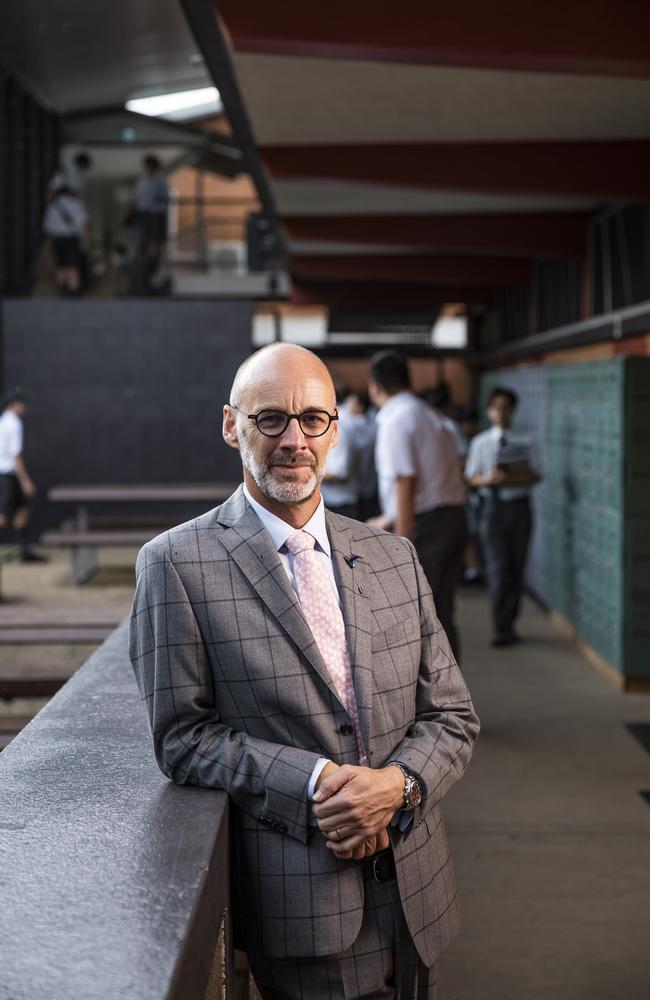
Paul Browning (St Paul’s)
Paul Browning believes it all boils down to building a culture of trust.
The principal of St Paul’s Anglican School says without a foundation of safety and confidence, people will not be willing or able to make the most of their education.
“Learning can’t occur unless people feel safe within that culture,” he says. “They can’t try new things. One of the key roles of a principal is building a great organisational culture where people love coming to school and can just thrive as people.”
This has been central to Dr Browning’s time as leader of the Anglican independent school, in Brisbane’s northern suburb of Bald Hills.
When he arrived as principal in 2008, the school was wading through the aftermath of what was later deemed a failure of the “most fundamental obligation”, to keep young people safe. It had hosted paedophile school counsellor Kevin Lynch from 1989 until his death by suicide one day after he was charged with nine child sex offences in 1997. Authorities now believe he was responsible for the abuse of about 120 boys during his time at the school.
The impact of his actions had cut a swath through young men’s lives and the foundations of the school, leaving a distrustful, hurting community.
And it was all examined in forensic detail under the light of the 2013-2017 Royal Commission into Institutional Responses to Child Sexual Abuse.
“St Paul’s was a very hurting organisation, a deep-seated hurt and a lack of trust,” Dr Browning says.
It was his role to reshape and rebuild the school into a community where students were safe, and educated as whole people – their character, and their spiritual, physical and emotional development.
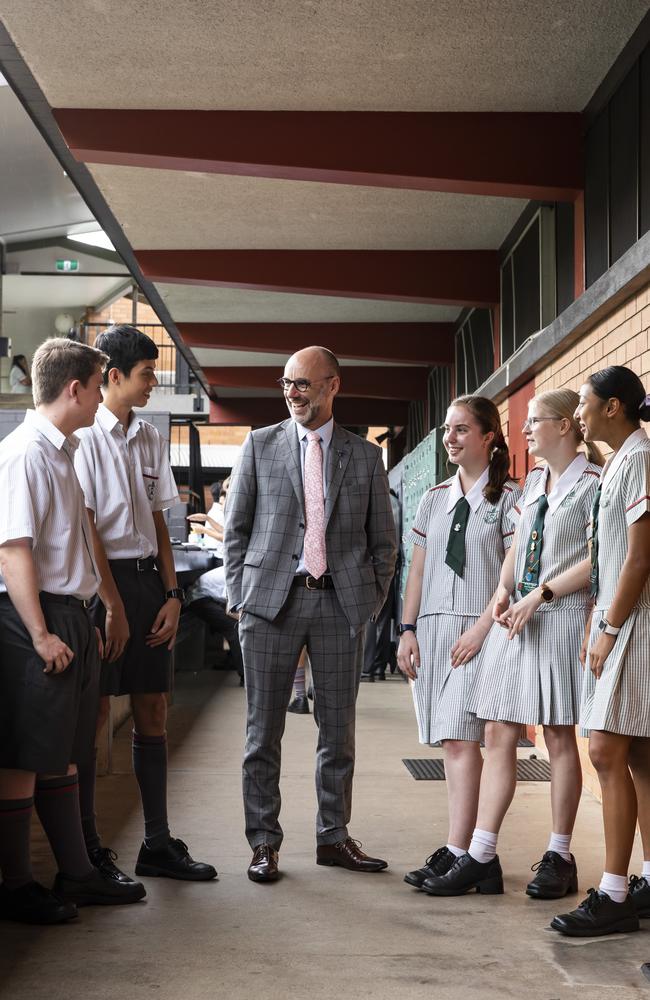
“Cultures are created as a result of work and leadership,” he says. “At St Paul’s School it was about healing a community and changing the culture to create one where there is high levels of trust.”
There is also a vision for the future. Dr Browning is focused on delivering young people into the world with the right skills for the contemporary era.
He bemoans the structures of education that, he says, continue to teach young people for the industrial era instead of our digital age. “We’re not rethinking what skills, dispositions, character traits a young person needs to thrive in a world that is very different to the one you and I grew up in,” he says. “I think we’re doing young people a disservice by not rethinking that and instead trying to make better what we’ve done for decades and decades.”
In order to craft a new way, at St Paul’s they developed the Realms of Thinking program to teach for creativity and character. Dr Browning says these two skills will enable young people to thrive in the new economy and become global citizens. To him, that is success.
“For me it’s important the young person is confident; they can acknowledge the opportunities are there before them (and) the goals they have set for themselves – they’re on their way to achieve them,” he says. “Hopefully they will look for opportunities to make a difference in the communities in which they live and work, too.”
Dr Browning says his work leading the school is really about service.
“The real privilege of being a teacher and an educator and a principal is you’re invited into people’s lives and their stories,” he says. “The royal commission was a highlight of that. Being invited into the lives of victims and be part of their story was a real privilege.”
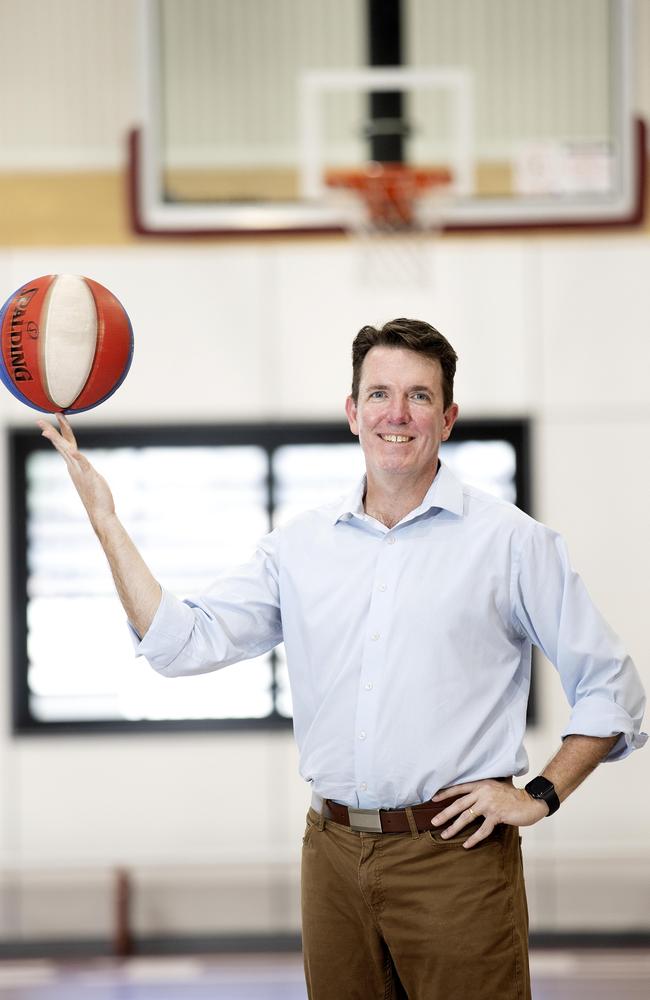
Andrew Peach (Marsden SHS)
If they look closely, the 10,000 locals who attend community and sports days at Marsden State High School in Logan, south of Brisbane, might catch a glimpse of the school leader running the water for the Marsden Makos rugby league team.
Executive principal Andrew Peach – who is currently taking leave from the role to work for the NRL – says leading one of Australia’s largest schools is not just about administration, human resources, facilities management and all the other facets of running a multimillion-dollar operation.
It’s also about maintaining a connection to the classroom and understanding the daily challenges of his charges.
“As a principal you could get caught up dealing with the business side of the school, but it’s about staying connected to the students as well,” he says. “I taught an English class a couple of years ago. That was also really valuable from a principal perspective, being in the classroom and doing tasks you expect teachers to do: marking rolls, checking uniforms, doing all those operational things.
“Also, things like running the water for the rugby league team and staying involved.”
When Mr Peach arrived at the school in 2014, there was staff turnover of 30 per cent in the year. There were about 1800 students.
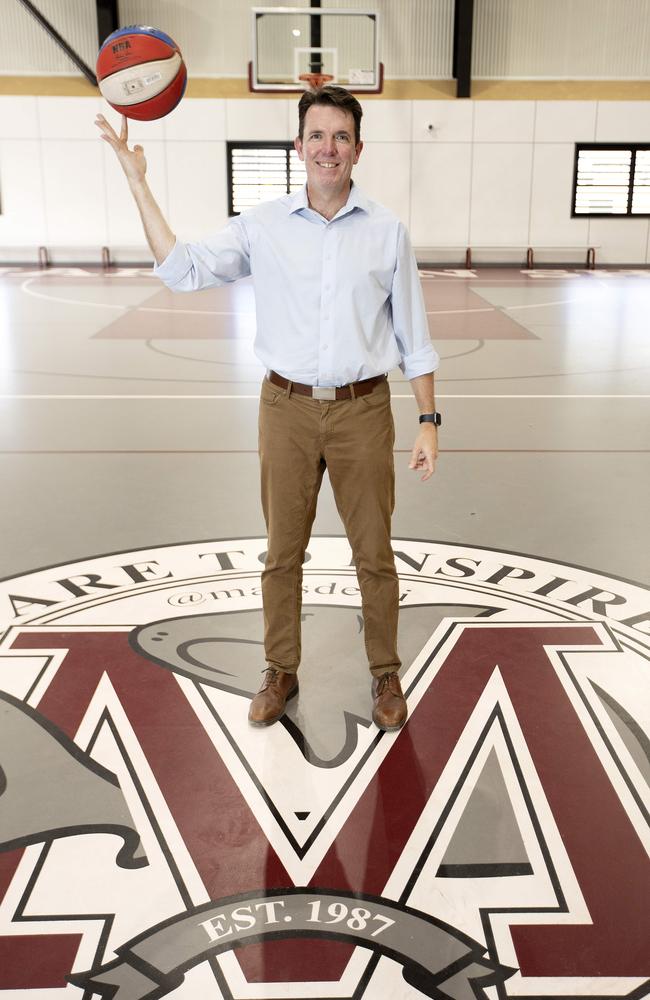
While Mr Peach is at pains to say the school was operating at a high level – “this is not a turnaround story” – he acknowledges there were staffing and recruitment issues that needed solving.
In order to enable students, he had to build up the teachers. This prompted a focus on staff professional development and training, with new teachers taking weekly classes and aspiring leader sessions three times a year.
The culture of high expectations was ramped up, along with partnerships with industry and local sporting, cultural and community groups to develop new programs and facilities for students.
“Expectations are really important for all of us,” he says. “Being clear about what we want to see, having the belief that our kids can meet our high expectations and following up to ensure that our words have meaning are really important to our processes across the school.”
All this has led to a school of more than 3600 students this year, with a teaching staff of about 300 that won a national education School of the Year award in 2020 and the Australian HR Awards Best Graduate Development Program in 2021. Last year, the number of teachers who left could be counted on one hand.
Mr Peach says it has also been critical to involve the wider community of parents, former students and local organisations.
“We know we can make a good impact across the Logan community as well,” he says. “That’s something that is also at the core of our mission.”
But in the end, it comes down to the teenagers themselves. “The joy of working in schools is that you get the chance to play a small part in the future of some amazing people,” he says. “It is a real honour to see some of the successes of our kids and the positive impact they make as they grow into adulthood.”
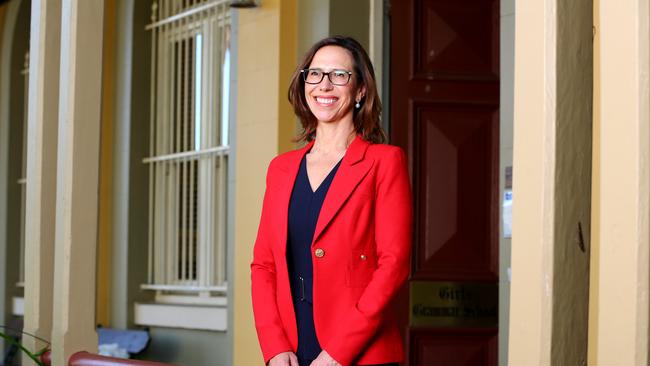
Jacinda Euler (BGGS)
Ms Jacinda Euler says her mission is clear.
As principal of one of the leading schools academically, and the custodian of some of the best facilities in the state, the Brisbane Girls’ Grammar School leader says her core role boils down to providing a sense of belonging, minimising distractions, and focus.
“(It’s) to maintain a sharp, crystal-clear focus on what matters above all else – the students and their learning,” she says. “There are so many distractions, but it is actually quite straightforward if you remember to do that.
“A school should be a place where on most days, most people feel a deep sense of gratitude to be there – understanding the privilege and life-changing impact of a good education, and also that learning for its own sake is inherently worthwhile.”
It is now Ms Euler’s 10th year as principal at BGGS. Over that time, the non-selective central Brisbane high school has continued to accelerate its academic prowess.
Last year more than seven out of 10 students achieved an ATAR score of more than 90 or above. This is roughly equivalent to scores of 1 to 5 under the previous OP system, or roughly the top 15-20 per cent of students.
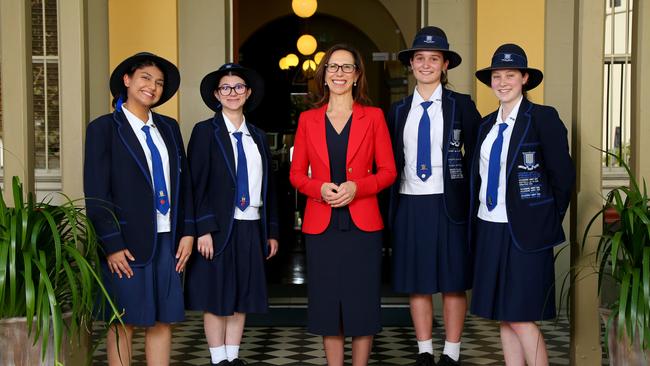
But Dr Euler points to the spirit of the school – and not just the outcomes – as key achievements: “While the big, notable achievements are easy to be proud of, what I take the most satisfaction in is leading a school where teachers model intellectual passion, professional engagement, pedagogical expertise and curiosity through a period of extraordinary change,” she says.
She started out her career in advertising, before taking up a job as an English teacher at Urangan State High School in Hervey Bay at the age of 27.
“I loved it,” Ms Euler says. “My experience teaching in the classroom continues to inform how I perform in my role as a principal. The importance of empathy – of understanding the everyday requirements of teaching and learning, the challenges our teachers and students face – cannot be underestimated.”
She says the world continues to be ever-more complex and switched on, with the evolution of technology a “doubled-edged sword”.
“It is ubiquitous and essential to so much of modern learning, and yet at Girls Grammar we ensure we are distinctly aware of the importance of balancing digital and off-line learning,” she says.
“The impact of technology, particularly social media, has created new challenges.
“Our students are now constantly connected with their parents, one another and with outside influences we have no control over – something that appears to be sapping their time, removing opportunity to be alone and fuelling anxiety.”
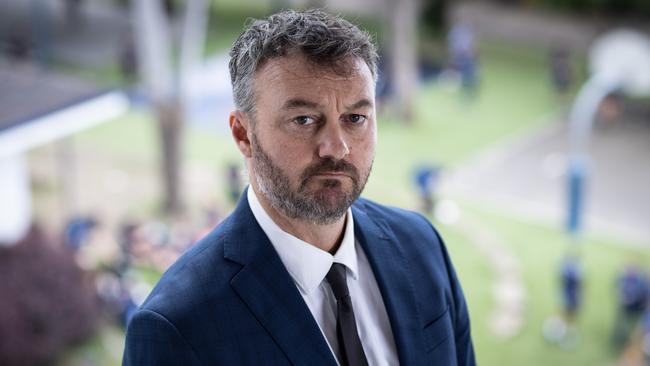
Mick Hornby (Mabel Park SHS and Indooroopilly SHS )
The medical challenges faced by a single student at Logan’s Mabel Park State High School inspired principal Mick Hornby to jump through the regulatory hoops and install a general practitioner at the school.
Faced with the plight of a teenager without effective access to healthcare, Mr Hornby launched an 18-month plan to allow doctor visits at the campus.
They started at an on-site clinic in 2018 and the initiative has now spread to more than 50 schools.
“It became apparent that he had needs from a health perspective,” Mr Hornby says. “If he doesn’t get the medical support then how can we educate him. Then that led to, ‘Why can’t we have a GP in the school?’
“It was a great learning curve. A lot of people said schools were school and health was health and the two shouldn’t mix. To get it over the line and see it open in other schools, that was great to see.”
Whether it’s a student, a teacher or a community, Mr Hornby – who is currently on secondment as acting executive principal of Indooroopilly State High School – wants to meet them where they’re at, then figure out a plan to succeed.
At Mabel Park his role was to oversee a diverse community of students and families representing 70 cultures within the 1600-student secondary school.
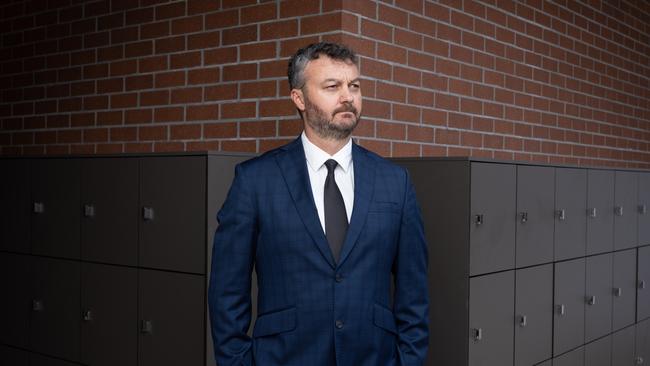
He recognises that success does not mean the same thing for everyone. Being the first in the family to finish school is a great achievement for some, just as gaining entry to university or winning a full-time apprenticeship is a triumph for others.
“There’s definitely not a one size fits all,” he says. “Whatever that success is for them and (that) they reach their potential, that’s what I love to see.”
Earlier in his career Mr Hornby travelled and started working as a teacher in Scotland, gaining an appreciation for global diversity.
When he took up his first role as Mabel Park’s principal in 2015, he found that cultural mix right in front of him. But it wasn’t always a source of pride.
The school population had dwindled from about 1200 students in the early 1990s to about 500. It was plagued by “not the greatest perception”, he says.
“It was important to come in and really listen, to respect that path and understand the school before, and build the relationships with the school and the community,” he says. “Then highlight some aspects we could improve on. I thought it could be a great school.”
Mr Hornby, together with his team, set about developing a new teaching and learning framework, including additional support for disengaged students.
He built up the sports and cultural elements and encouraged pride in students’ cultural backgrounds.
They established a new health and care industry vocational training program to allow students to gain much-sought after nursing, aged care and disability care roles.
“Once I listened, that really empowered them,” he says. “They saw they could be better. That’s when the ball started rolling.”
“I never, ever thought to be a principal,” he says. “I really honestly love having chats with people, then being a teacher and in education, you can see that care and respect for people. You can start to see people reach their potential.”
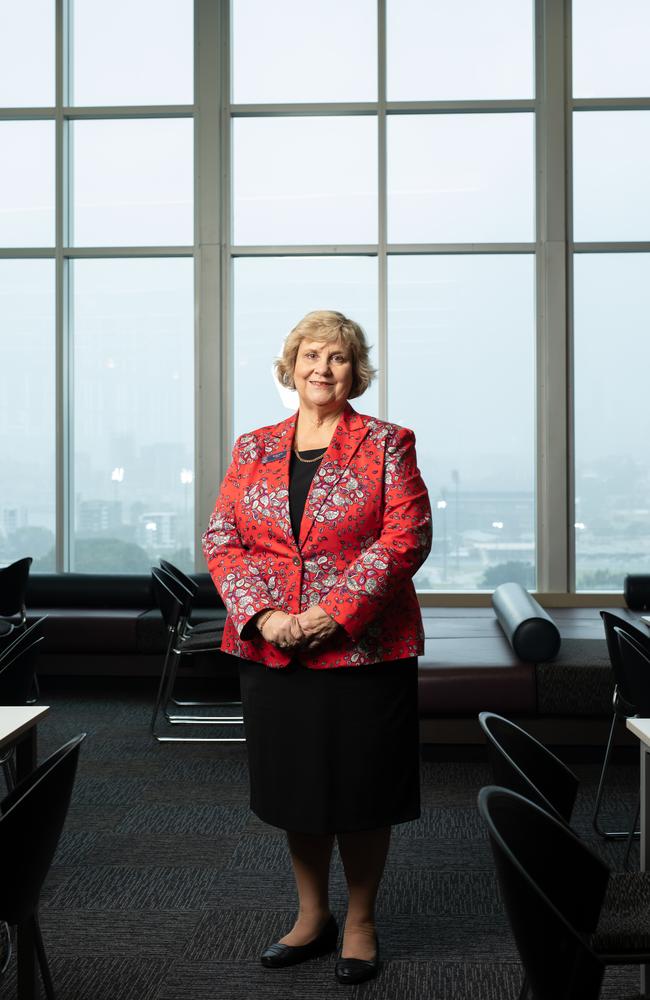
Ros Curtis (St Margaret’s)
Building a successful school means creating a community for veteran principal Ros Curtis.
The leader of Brisbane’s St Margaret’s Anglican Girls School since 2011 strives to provide a sense of belonging among students and staff, all underpinned by strong and clear values.
“Having the best interests of the students as the focus of all decision making is at the core of these outcomes,” she says. “As the leader of the school, students and staff do look to you for direction and guidance. You do have the capacity to have a positive influence through your words and actions, which is very important in realising that ultimate goal of a connected community working together.”
During Ms Curtis’s tenure at the Ascot-based school, enrolments have grown more than 60 per cent and the school infrastructure has been transformed. St Margaret’s offers pre-Prep to Year 12 education. It is girls-only from Year 1, and has a boarding house from Year 5.
It has received multiple national awards for innovation in teaching and staff development.
Last year students from the fee-paying school also achieved stellar academic results. More than 8 per cent recorded an ATAR of more than 99 (the top 1 per cent), and two out of three had a ranking of more than 90. Importantly, 26 students also achieved trades and training certificates.
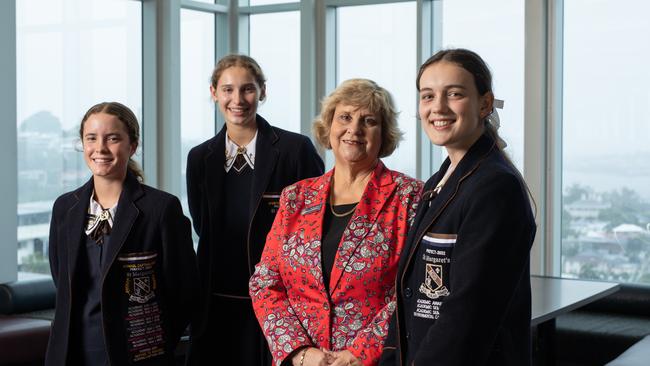
Ms Curtis says the school has to continue to grow and it is not enough to rest on its existing reputation.
“It’s been important to me to also lead and grow the school that has a reputation of great substance, one that does not rest on past reputation or achievements or on the appearance of a good reputation; rather one that stands the test of time and displays depth and substance in all that it does,” she says.
One of the key factors, she says, is staff and their development. She personally interviews all teachers and incentivises new ideas through internal awards.
Programs that have resulted from these ideas have gone on to win national education awards, including an academic adviser program for Year 9 to 12 students, and the St Margaret’s Plus Program to document extra-curricular activities, highlighting the girls’ soft skills such as creativity and communication.
All this, Ms Curtis says, stems from having the right team in place. “Ultimately as principal you are highly accountable, so you do become very much more aware of the impact your words may have, as people will take your lead.
“Your communications must always be aligned with your ultimate goals and be clear and consistent.”
TOP MARKS: Other principals doing amazing work
Brett Webster
Ormiston College
Innovation, tech and teacher professional development are at the heart of Mr Webster’s vision for the independent southeast Queensland school.
Linda Evans
Fairholme College Toowoomba
As the leader of the girls’ school in Toowoomba, Dr Evans was a strong advocate for her boarding students during the Covid pandemic when restrictions impacted their return to rural homes for holidays.
Wade Haynes
Brisbane State High School
Mr Haynes leads Queensland’s biggest state high school in its 101st year. A partially selective public school and part of the Greater Public Schools group, State High is a diverse, high-achieving school with a focus on academia, resilience and careers.
Dianne Aylward
Moreton Bay Environmental Education Centre
Ms Aylward oversees the STEM-focused outdoor day visit centre at Moreton Bay.
She has led STEM, writing and other initiatives that have been implemented statewide.
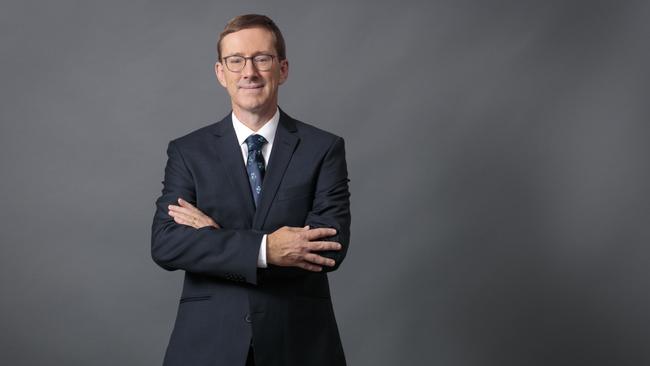
Gary O’Brien
Cannon Hill Anglican College
A holistic education is at the heart of the Cannon Hill Anglican College (CHAC’s) leadership, with nationally significant initiatives in social justice, STEM and entrepreneurship.
Glenn White
Cape York Aboriginal Australian Academy and Biggera Waters State School
Overseeing the remote Cape York school, Mr White contributed to community change and teacher education. Regular attendance and academic improvement were key areas of focus.
Nigel Hughes
Southport State High Independent Public School
Mr Hughes leads the independent public school, which has greater community input into operations and strategy. Amid rising enrolments, he has a focus on innovation and leadership.
Peter Britton
Ipswich Girls’ Grammar School
Mr Britton was the first male in the Ipswich girls’ school’s history to take on the role of principal and CEO more than a decade ago, and has installed a vision of high expectations, ethics and compassion.
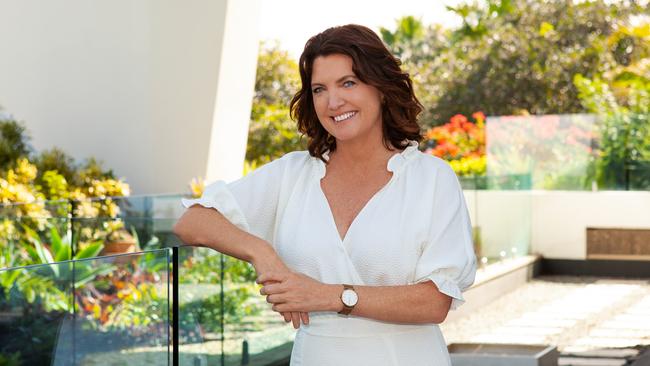
Susan Dalton
Miami State High School
An award-winning leader in education, Ms Dalton previously led the bustling Gold Coast school, and struck partnerships with sporting teams, universities and businesses to enrich student experience. She has been recognised for her work to support deaf and hearing-impaired students.
Meredith Wenta
Kirwan State High School (former Executive Principal)
Mrs Wenta was an advocate for an education for everyone at this multicultural school in Townsville. It reaped results, with strong academic and vocational completions, as well as teacher education.





